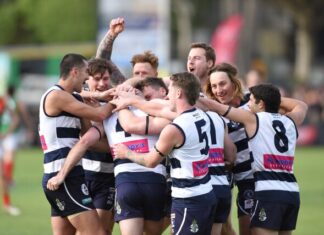 Norma Jackson and her sister Alma Patullo with a picture of Norma’s husband Norm in uniform. The pair remember the relief that swept through Pakenham on VP Day well.
Norma Jackson and her sister Alma Patullo with a picture of Norma’s husband Norm in uniform. The pair remember the relief that swept through Pakenham on VP Day well.By Paul Dunlop
PEACE was called 60 years ago, but Norma Jackson’s memory of the day World War II ended has not dimmed with time.
The Pakenham woman and her younger sister Alma Patullo vividly recall the party atmosphere that galvanised the community on that famous August day in 1945.
After six years of conflict, and with most families still carrying the scars of the Great War three decades earlier and the subsequent Great Depression, news that the war was over was almost too good to be true.
“I remember it as plainly as can be,” Norma said.
“The night before, on the 14th, Alma and I were listening to the radio and there was a news flash that the Japanese wanted to surrender.
“Our father, Jim Marshall, was the Pakenham policeman so we lived at the police station. Everybody was tuned into the radio. We couldn’t believe what we were hearing.”
Norma and Alma smile when they recall the impromptu celebration that brought the town’s entire population into the streets.
“It was such a thrill to think it had finally happened,” Norma said.
Alma remembers dancing for joy and driving around with her future sisterinlaw Dorothy on a horsedrawn lorry.
“We were singing and yelling and banging on anything we could, picking up people as we went along,” she said.
“The steam train pulled into town and the driver was tooting and people were hanging out the windows cheering and clapping.
“There was no school, everybody was so excited.”
Norma and Alma were typical of their generation, left to wonder and worry about a faraway conflict that got increasingly close to home.
Norma’s sweetheart and future husband, Norm, the girls’ brother Len and cousin Vern were among the hundreds of local ‘boys’ who were away at the war.
Many, including Vern, who was shot down while on a flying mission in Europe, never returned.
“After six years we were starting to wonder whether it would ever end,” Alma said. “There was rationing in everything. We had a cow, chooks and a vegie garden so we were okay, but it was not an easy time.”
Norma worked at the post office while Alma, then 19, had just finished school.
As a policeman, the girls’ father often had the unpleasant task of passing on the news to families that their loved ones had been killed in action.
“Not a lot of people had telephones then, so dad often had to inform the families,” Norma said.
“I remember one chap was killed and his wife was pregnant. Dad waited until the next morning rather than go that night and tell the wife, who was almost due to have her baby.”
Norma also received more than her share of bad news.
The telegrams coming from the other side of the world through to the Pakenham post office almost invariably carried bad news, eventually prompting Norma to give up her job and go to work at the sawmill.
“We’d get the telegrams through of who was missing and who was killed,” she said.
“I used to hate the telegrams coming through; you knew it would be someone you knew.”
Fortunately for Norma, her future husband made it through the war although it was not until the following April that he made it home.
Pakenham was a much different place then, just a country town, Alma and Norma said.
Norma would write to Norm almost every second day and religiously sent him the Sporting Globe each week so he could keep up with the football and racing results while he was in New Guinea.
Norm, of course, came home to be a champion football player with Pakenham.
The girls’ brother Len was sent to Singapore after the war ended to bring home the freed Australian prisoners.
“He always said the first chap he saw coming to get on the boat was a local boy Jim Fennell,” Alma said.
The two sisters travelled to Melbourne for the recent VP day commemoration and enjoyed the event immensely.
The war was not spoken about much by those that were there.
Norma said her late husband would laugh with friends at reunions about the funny things that happened but, like many returned soldiers, rarely talked about his experiences.
“Once they got home, they wanted to forget about what had gone on. It took some time for a lot of people to settle down,” Norma said.





